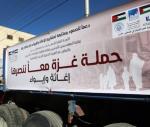You are here
Amman Security Colloquium aspires to WMD-free region
By Rana Husseini - Nov 07,2018 - Last updated at Nov 07,2018
AMMAN — Jordan is implementing its peaceful nuclear energy programme “in a fully open and transparent manner, and in strong coordination with the International Atomic Energy Agency”, Jordan Atomic Energy Commission (JAEC) Chairman Khaled Toukan said on Wednesday.
“Jordan, being a signatory to the Non-Proliferation of Nuclear Weapons Treaty (NPT) and additional protocol to the NPT, has set a good example in implementing its peaceful nuclear energy programme,” Toukan, a former university president and three-time government minister, said, addressing key officials of the nuclear security sector from 39 countries, during the opening session of the 12th Amman Security Colloquium.
Jordan has taken stringent measures to ensure compliance with all national and international standards governing nuclear safety and security throughout all its nuclear activities, he added.
Toukan touched on Israel and Iran as two countries that are “a cause of concern when it comes to the nuclear weapons race in the region”.
The organisers of the event said that the main aim of the conference was to discuss the Arab stance on international events, and the current stalemate in efforts to remove weapons of mass destruction (WMD) from the Middle East.
“The refusal of Israel to join the NPT has created great concern among countries in the Middle East region over the acquisition of nuclear capability by Israel. Thus, Israeli nuclear capability has triggered a potential nuclear arms race in the Middle East,” Toukan explained.
Iran’s traditional and “unconventional climbing of the nuclear ladder has become one of the most pressing concerns in the region”, said Toukan adding that in response to a nuclear-weapons-capable Iran, “several states in the region will try to acquire the capability to break into nuclear weapons development”.
‘Transparent
energy roadmap’
Khaled Toukan on Wednesday also said that Jordan had taken several important steps along a transparent roadmap that sought to implement the national strategy for energy.
The strategy was developed in 2007 following in-depth studies to formulate various reliable, secure, economic and sustainable energy sources for Jordan, with nuclear energy as one of its main contributors, Toukan told the gathering.
Toukan stressed that JAEC had pursued the promotion of nuclear energy in Jordan, with strict adherence to nuclear safety and security and an advanced selection of safe nuclear reactors.
“The use of nuclear energy is one of the key alternatives to transition from total dependence on fossil fuels to low-carbon energy sources in line with modern developments in the energy industry,” the former minister said.
He pointed out that nuclear energy has been demonstrated to be an effective option for sustainable electric power generation and water desalination, offsetting the lack of natural resources and the dependence on imported fossil fuels that has been the traditional source for energy production in Jordan.
‘Ambitious undertaking’
Also addressing the gathering was former assistant to the US secretary of state, Thomas Countryman, who said he would speak frankly about the Middle East Nuclear-Free Zone, and the escalation of US-Iranian confrontation.
“The failure to convene a conference to begin discussion of a Middle East Nuclear and WMD-Free Zone is a disappointing diplomatic failure, for which I take my share of responsibility,” Countryman said in his keynote speech.
“No one ever thought it would be easy to achieve such a zone, but many understated the difficulty of even beginning a process,” the former US diplomat added.
“There simply is no precedent in modern history for such an ambitious undertaking in a region constantly beset by conventional conflict, and where key states are largely incapable of speaking to each other in a normal fashion,” he explained.
Still, Countryman added, “we came closer in 2013 than many appreciate, and it remains valuable to analyze carefully not just — on a macro scale — the regional obstacles, but also the particular sticking points we encountered”.
“We had an agreement in principle among regional states [not including Iran and Syria], to convene the conference once there was an agreement on a simple agenda. Unfortunately, both the Arabs and Israel viewed the initial agenda as pre-determining the entire course of negotiations,” he stated.
“The Arab states saw the inclusion of a broader spectrum of regional security issues as creating a diversion for Israel to permanently sideline actual discussion of a treaty; while Israel believed a treaty would be meaningless without at least a discussion of the wider security issues separating it from its neighbours,” Countryman explained.
Turning to Iran, Countryman said that the threat it poses in the region and its stability is clear.
“It [Iran] seeks to be the winner in a regional ballistic missile race, but it’s not the only regional state playing that game… Iranian leadership is hypocritical, corrupt and kleptocratic, but that is not a unique condition,” Countryman said.
He added that he believes that Iran’s “malign activities must be countered, [and] met with resolve… And I would like to see the United States lead that effort. But I would also like to see the US choose its partners in that effort not according to how fervently they hate Iran, not according to how well they stroke the president’s ego, but according to their reliability and effectiveness”.
During the second part of the opening session, US Under Secretary of State Andrea Thompson tackled four regional security challenges and outlined the United States’ role in addressing them with the allies and partners.
One of the challenges was Syria’s unacceptable use of chemical weapons and the resulting deterioration of the international norms against chemical weapons use, Thompson said.
Since acceding to the Chemical Weapons Convention in 2013, she said, Syria has “repeatedly and systematically used chemical weapons against the Syrian people in gross violation of the convention. It has done so with the aid and protection of Russia, which has vetoed relevant resolutions in the UN Security Council and engaged in a calculated campaign of disinformation and distortion”.
Another challenge according to Thompson was Iran’s full range “destabilising activities in the region”.
“Iran must take lasting steps that demonstrate once and for all that its nuclear programme will remain exclusively peaceful and to fully cooperate with the IAEA, and all of Iran’s nuclear activities must be fully consistent with its IAEA safeguard obligations,” she stressed.
Meanwhile, US
Under-secretary of Energy for Nuclear Security Lisa Gordon-Hagerty said the United States considers His Majesty King Abdullah and Jordan to be indispensable partners in this region.
“Jordan’s work to promote dialogue and innovative approaches to address emerging security challenges grows more essential every day — not only here in the Middle East, but on a global scale,” Gordon-Hagerty said in her keynote speech.
The event, which was held at Jordan University, was sponsored by the Arab Institute for Security Studies, the Geneva Centre for Security Policy, the government of the Netherlands, Konrad Adenauer Stiftung, the Stanton Foundation and the Nuclear Threat Initiative.
Related Articles
AMMAN — Jordan has always been an advocate for the establishment of weapons of mass destruction (WMD)-free zone in the Middle East, Jordan A
AMMAN — Officials and representatives of international organisations on Wednesday discussed measures to reduce the use of nuclear weapons, a
Iran on Monday demanded that countries possessing nuclear weapons scrap any plans to modernise or extend the life of their atomic arsenals, while branding Israel a threat to the region due to its presumed nuclear stockpile.















